Look out for our A to Z to parenting on our Facebook, Twitter and Linkedin posts. Here’s some to get you started. If you have any of your own please do let us know.
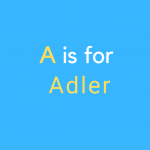 A is for ALFRED ADLER.
A is for ALFRED ADLER.
Sharing Parenting programmes are based on Adler’s theory that ‘all behaviour has a purpose’. Do you often wonder why your child wants your attention as soon as you try to make a phone call? It is likely they are trying to fulfill their NEED to CONNECT with you. At Sharing Parenting we support parents, carers and professionals to help them find the reason (or need) behind any challenging behaviour.
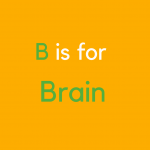 B is for BRAIN.
B is for BRAIN.
Did you know that how we behave with our children when they are young can determine the way the brain structures? Modelling kindness and respect and supporting your toddler or child to learn such as to wait, take turns, say please and thank you helps them to regulate their first emotions (such as anger) and make connections from the front part of the brain to the back (which helps them learn about others and empathy). The brain ‘re-prunes’ in the teenage years too – Have you ever wondered why some of your teenagers behaviours are similar to when they were a toddler? At our Sharing Parenting Programmes we look at the changing brain in Raising Toddlers, Raising Children and Raising Teens Let us know if you would like us to book you a FREE place.
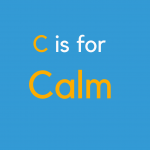 C is for CALMING techniques.
C is for CALMING techniques.
When children (and indeed everyone) gets angry they can get what’s called ‘emotionally flooded’. This means all rational thought disappears and is replaced with a rush of strong emotional feelings (such as frustration or anger).
As the brain floods it passes the ears so makes it difficult to listen and reason. We need to support our children to calm down and having a friendly chat or just telling them to ‘calm down’ is probably not going to work at this point – if you’ve ever tried to reason with a child who is in the middle of a tantrum you’ll know what I mean!
Breathing slowly, counting to 10, blowing real or imaginary bubbles, laying down with a teddy on their chest and watching it rise and fall, sitting like a frog, giving yourself a hug are all strategies which will help calm the child, the brain and the situation.
It is a good idea to show your child and practice these strategies before the next outburst when they are calm and will listen and in a better place to understand what you mean.
You and they can then be ready when they are feeling emotionally flooded and you can remind them to blow the bubbles or watch teddy etc. Remember too that children often feel scared and confused after a tantrum or emotionally flooded moment so as soon as they have calmed down be ready to ‘catch them being good’ (however small) and reassure and encourage them positively.
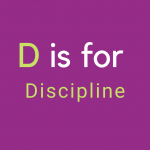
D is for discipline
Effective discipline ‘teaches’ children what is right. This is different from punishment which focuses on what is wrong.
The most important thing you can do for your children and teenagers is to keep open communication and protect their self esteem. This in turn will help them make positive choices in life.
Punishment is based on revenge, is harmful to the parent-child relationship and even though misbehaviours may stop this is because of fear and anger and does not teach children to make positive choices in the future.
Discipline is based on teaching and learning, teaches children new positive behaviours and helps them feel safe and learn to be responsible.
You can find more about these positive behaviour strategies on our courses.
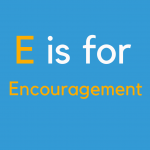 E is for Encouragement
E is for Encouragement
Give them COURAGE. Focus on the effort that your children are putting into something (however small rather) than the end result.
Encouraging words and actions during the process will have a big effect on your child’s self esteem and their motivation to carry on or have the courage to start something new.
Learning to have a go even if they do not always succeed (or be the best) at something are good skills for life.
You can find more about positive strategies for children and professionals working with families on our courses.
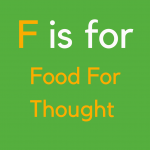 F is for Food for Thought
F is for Food for Thought
Did you know we run a ‘Food For Thought’ course for parents?
Many parents are concerned about their child’s change of behaviour around food – often at around 18 months or 2 years old when they learn the word ‘No’ and start to assert themselves.
On this progamme we look at:
- Feelings around food – Where do they come from/ how can we change these?
- Making changes – and how to do this calmly and on a budget
- Healthy diets – what is actually good for us and our children and why?
- Meal times – and the challenges around this time
- The power of food and behaviour changes – How does what we eat really affect our and our children’s behaviour?
Please contact us for more information or to register your interest on our next course.
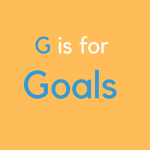 G is for Goals
G is for Goals
Are your parenting goals realistic? On our programmes we say “there’s no such thing as a ‘perfect parent”.
As parents we often put unrealistic expectations on ourselves and then feel bad when we don’t live up to them!
As long as you are doing your best that is usually good enough. A bit of positive ‘self talk’ can work here. “I am proud of myself for doing my best, I can do this, everyone has bad days” etc. This is also good ‘modelling’ for your children.
Our children need to know that it’s OK when they make mistakes or have a bad day too.
Keep the behaviour separate from the person and reboot, after all tomorrow is another day.
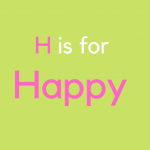 H is for a Happy home
H is for a Happy home
Isn’t this what every parent wants for their child?
We receive positive feedback all the time from parents and carers who have been on our courses and tell us they now have a calmer household.
A few simple, but effective, tips and strategies can make all the difference such as ‘don’t say don’t’.
Try something right now …DON’T think of a blue elephant! What are thinking of? I’m guessing a blue elephant or at least an elephant! That’s because it’s very difficult to not visualise something when the word has been said.
Think about what you DO want your children to think of or do such as ‘Stay on the path” (instead of ‘don’t run on the road’) or ‘Hold my hand’ or ‘Put your coat on the hook’ (instead of ‘Don’t leave your coat there’).
It takes practice and if you find yourself saying ‘Don’t’ follow it up with a DO.
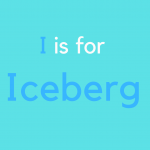 I is for Iceberg
I is for Iceberg
Think of behaviour like an iceberg. The part of the iceberg you can see is the tip the hidden part is bigger (like an upside down triangle).
The BEHAVIOUR you see is often the tipping point. There is usually something else that is behind or led to the behaviour.
Are they hungry? Tired? Feeling scared or insecure? Are they feeling left out? It’s easy to jump to the wrong conclusion or try to deal with the behaviour that is on front of you.
As a first response it’s always a good idea to feed and water them, give them some one to one time and try and listen to what might be going on for them. We call this the NEED behind the behaviour. You can find out more on our programmes.
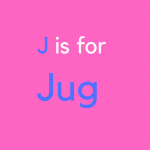 J is for Jug
J is for Jug
Did you know parents can be better parents when they take out for themselves?
Imagine your energy as a jug filled with water. When you wake up (after a good nights sleep!) your jug is full.
As your day progresses you slowly empty your jug – you make the kids breakfast and spill the milk on the floor, the children remind you they didn’t do their homework, an unexpected bill comes in the post, as you leave for school your bike has a puncture – before you know it your jug is half full or empty!
How do you think you will cope now when something else goes wrong?
When our jug is empty it is difficult for us to stay calm and model the behaviour we want to see from our children.
So how are you going to fill your jug over the day?
Suggestions from parents on our programmes include: sitting down with a coffee, taking 5 minutes to look at a magazine, phoning a friend for a chat, taking a bubble bath, going for a walk, going for a swim etc.
As we refill our jug we will be more able to cope with life’s challenges and better role models for our children.
Of course life is not always perfect and it is not always possible to fill our jug when we most need it, or we start our day with an empty jug (if we have been up in the night). On those days recognise that you are running on empty and lower your expectations for the day. Instead of tackling the 20 things on your ‘to do’ list, be kind to yourself and only do the essentials for the day and plan (and arrange with someone who can support you) when you can next refill your jug. Your children will be glad you did.
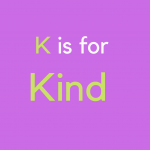 K is for Kind
K is for Kind
Of course we all want to be kind and we want others to be kind to us but sometimes when we are stressed (and our jug is empty) it is easy to say unkind things.
Our ‘parenting style’ (look out when we get to P is for…) will have an influence on our children’s self esteem and modelling kind behaviours to them will help them to be kind to others to.
An ‘assertive’ parent will be kind even when they don’t want to, stay calm – count to 10 or STOP and THINK before they ACT and say sorry when they have said or done something they know was wrong.
Kindness is infectious so try to be kind and pass it on.
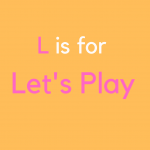 L is for Let’s Play
L is for Let’s Play
Did you know that your child is learning when they are playing?
Play teaches so many things – Maths and number work, Speech and language development, science – how things work and why, learning to share and take turns, colours and matching and so much more.
What did YOU play with as a child?
WHO did you play with?
What did you LIKE about the way they played with you?
On our ‘Let’s Play’ programmes we explore this and lots more. It’s always interesting to hear that most people’s favourite play memories did not include expensive toys but were usually free or very low cost such as; playing in in the sand or mud, collecting shells and pebbles then painting or stacking them, playing in a big cardboard box (is it a house, a spaceship, a car? etc), playing with water (a washing up bowl with old washing up and shampoo bottles and sieves etc), clothes airer and sheets (making their own tent and personalise an old sheet with colouring pens), threading pasta tubes onto string and making you own jewellery, board games (pick up pre loved classics from your local charity shop or car book sale), treasure hunts and geochaching, playing pooh sticks and splashing in puddles in the rain.
What was your favourtie?
What do your children like playing with you?
Try ‘child led’ play, take the pressure off and just sit with them and comment on what they are doing rather than quizzing them ”You’ve got a red car and it’s moving along the mat”, “The car has got 4 wheels 1,2,3,4”
#TheBestThingYouCanSpendOnChildrenIsTime
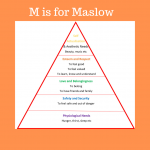 M is for Maslow
M is for Maslow
Have you heard of Maslow’s Hierarchy of Need?
Have you ever wondered why you can’t concentrate on anything when you are hungry or tired?
Maslow’s theories are shown on a triangle. He said unless the NEEDS at the bottom are addressed you cannot move up the triangle.
This would explain why children are often moody when they come out of school – they are tired and need feeding! I had a friend who greeted her twins with a banana each when she picked them up from school – she knew what they needed and how to avoid challenging behaviour on the way home!
This is also why it may take a while for children (and adults) to settle in to a new house, group or job.
At first they may feel unsafe with the unknown or unfamiliar or that they don’t belong – once they start making friends and getting to know a new space just watch them thrive. Want to know more? Book onto to one of our FREE programmes.
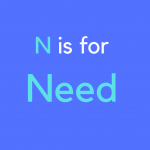 N is for Needs
N is for Needs
As NEEDS are so important we have looked at this before (please see J and M) so how are you doing?
How are you looking after YOUR needs?
Remember the oxygen mask on the plane – you have to put yours on first so you can then look after others.
Parenting is just the same! So take a moment to plan to have that coffee, read a magazine, ring a friend or something else that will fill your jug.
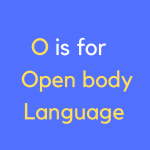 O is for Open Body Language
O is for Open Body Language
What does this mean? (I’ll give you a clue – the OPPOSITE of someone on their phone!)
Think about someone you like to talk to – someone who is there for you.
Are they looking at you, is their body facing you, are they nodding (and really listening) to what to what you are saying?
Do they ask open questions like ‘How do you feel?’, ‘What do think about that?’ etc rather than talking about themselves.
If you can do this for your children you will keep the communication open between the two of you – and help them to problem solve.
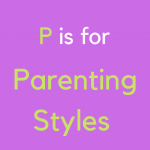 P is for Parenting Styles
P is for Parenting Styles
What’s your parenting style?
What parenting style did you grow up with?
At Sharing Parenting we discuss 3 different styles:
1. Aggressive – this is the Sergeant Major type, behaviours include shouting and threatening body language such as finger pointing.
2. Passive – Mr or Ms Marshmallow, likely to be giving in quickly to all demands, slumped body language, avoiding eye contact, quiet voice
3. Assertive – Mr/Mrs Firm and Friendly, Respectful, says sorry, prepared to change their mind – this is the one we should be striving to be.
In reality we are usually a little bit of all them and depending on how full your jug is can have a big effect on how you respond to your parenting demands.
Research has found that children living with an Assertive Parenting Style are more likely to have a healthier self-esteem, make better choices and take responsibility, solve problems, manages compromise and disappointment, feel involved and heard, is happy and respectful, accepts what they cannot change and is ready to learn at school.
Remember none of us are perfect but if you can try to use Assertive behaviours most of the time and learn to say sorry when you don’t your children will benefit from it.
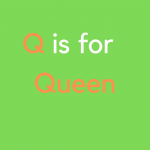 Q is for Queen
Q is for Queen
Do you have a little queen or princess at home? Or maybe a little monkey!
Labeling is included in our Sharing Parenting programmes and we discuss whether labels are a positive or negative thing.
If you have felt a connection from a relative who has also ways had a nickname for you then this can be a positive thing.
However, labels can be restrictive (even if you don’t mean them to be). For example does a little princess feel permission to climb trees, play with mud, join in with the games at Forest school or messy play? Does the little monkey sometimes want to be recognised for sitting still, concentrating, reading a book or playing quietly?
With a label it is easy for them and others to make assumptions about the person we are labelling.
Remember also if we are given a label it is sometimes easier to live up to it. That’s often why ‘naughty children’ just carry on with naughty ways – they have been given permission without you realising it. So, what can you do instead?
It is always better to describe the ‘behaviour’ not the person (or the deed not the doer). That was a ‘naughty thing’ is better than you are naughty. Or she enjoys playing football rather than ‘she’s the sporty one’. This then opens the options for children to explore – the girl who enjoys football might want to try her hand at art or the boy who is often quiet might want to join in with a noisy activity and this can support them to do so.
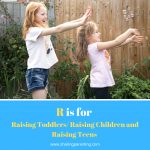
R is for Raising Teens/ Raising Toddlers and Raising Teens
Our ‘Raising … ‘ programmes support parents from 18 months-19 years old. We run Raising Toddlers for parents/carers with children aged from 18 months – 3 years old. Raising Children for parents/carers from 2 – 12 and Raising Teens for parents/carers with teens and pre teens aged from 11-19 years old.
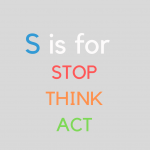 S is for Stop Think Act
S is for Stop Think Act
At Sharing Parenting we share lots of tips and strategies to support parents/carers and professionals to keep the atmosphere calm and to protect children’s self esteem for now and the future adults they will become.
These are only any good if we can remember to use them at the right time (although, none of us are perfect and being reflective and saying sorry are all good characteristics of an assertive parent).
So, what can you do in the heat of the moment, when you are all ‘emotionally flooded’. STOP THINK take a moment to calm down, count to 10, breathe and then ACT.
Traffic lights STOP THINK ACT Handout on our Raising Toddlers/Children/teens programmes.
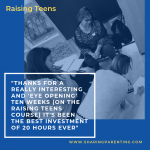 T is for Teens
T is for Teens
Do you ask yourself: “Why doesn’t my teenager want to talk to me anymore?”
“Why does my teenager want to spend all their time with their friends or in their room?”
or “What is happening to my teenager’s brain and how can I support them with these changes?”
Our Raising Teens programmes support parents with teenagers and pre-teens.
The brain takes on major changes during this time this coupled with hormonal changes can be a daunting time for both teenagers and their parents or carers.
Do you remember being a teen? It can be an exciting time with a feeling of new independence. Do you remember feeling confused with your parent’s reactions to your plans?
Someone once said ‘life makes sense when lived backwards’.
Prepare yourself with changes to come and pick up strategies to support your teens.
 U is for uncomfortable
U is for uncomfortable
Try this: Fold your arms, now fold them the other way. It’s not so easy is it?
Feels a bit uncomfortable and much easier to do it the way you have always done it.
Learning new parenting strategies can feel like this sometimes.
We have a saying ‘If you always do what you’ve always done, you’ll always get what you’ve always got!’
If you always do things the same way you will always get the same result (however much you will it to be different).
We share lots of tips and strategies on our programmes. Some need a little practice but are always worth the effort (and can help you remember how your children feel when they are learning new things and don’t always get it right the first time).
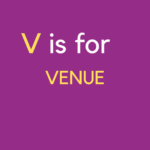 V is for Venue
V is for Venue
We are based in Newmarket, Suffolk, working in partnerships with Parents, Carers, Schools and Organisations, Children’s Centres, Community Groups and the General Public in Suffolk, Cambridgeshire, USA and the Middle East, delivering parenting support in the form of Courses, Workshops, Taster Sessions, One to One support and Community Pop up’s for parents to gain confidence and knowledge in their role as parents, or professionals supporting parents, in a non judgmental environment.
You can find us online and on Facebook, Twitter, Instagram and YouTube too!
W is for Welcome
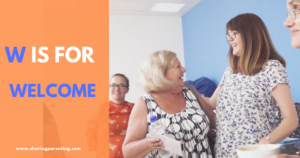
“I left each [session] looking forward to the next one.”
“I’ve made a new friend.”
“I felt like I was a bad parent before the course. I feel better about myself now.”
“I couldn’t wait to go each week. I came out of every session with something I could use.”
Just some of the comments from our recent Raising Children course.
Parents often tell us the hardest thing about attending our programmes is stepping through the door for the first time. After that it’s easy and there’s always a warm welcome waiting for you.
Picking up tips and strategies which have worked for other parents/carers and professionals is only part of attending our programmes.
Sharing and listening with other parents and carers who often are experiencing the same issues and concerns as yourself can be very reassuring.
Just knowing you are not alone can really help ‘A problem shared is a problem solved’. That said, we only ask participants to share if THEY want to.
Take a look at our Q&A page or contact us for more information.
X is for eXpert
 On our programmes we always say that we are not ‘experts’ (as no one is perfect) and we are always willing to learn but the many parents and professionals we have supported over the years, tell us our evidence based programmes and support has made a significant difference to their (and their children’s) lives.
On our programmes we always say that we are not ‘experts’ (as no one is perfect) and we are always willing to learn but the many parents and professionals we have supported over the years, tell us our evidence based programmes and support has made a significant difference to their (and their children’s) lives.
You can read some of our parents and professional comments on our website.
Y is for Youngest
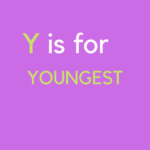
Does the baby of the family need to be treated different from the eldest?
Here are 2 pitfalls you can avoid when dealing with the youngest child:
Stick to the Rules: The saying “he gets away with murder” is based in reality.
Statistics show the last born is least likely to be disciplined and the least likely to have to toe the mark the way the older children did. You can be sure your older children are watching you closely!
Hand out Responsibility: Last born often wind up with less to do around the house for two reasons.
One, they are pros at ducking out of work.
And two, they are so little and “helpless” that the rest of the family decides it’s easier to do the work themselves. You want to raise a confident, self-reliant child so don’t promote this helpless image.
To find out more about Birth order and the effects contact us about details of our next course.
Z is for zzz’s
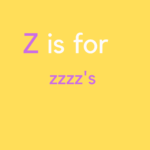
For this we have to revisit M is for Maslow and J is for Jug.
We know sleep is not something that is easy when you are a parent. That’s why you have to try to make time to fill your jug when you can and expect to do less on the days when you have been up or night or a sleep deprived.
When you are being hard on yourself ask yourself ‘What advice would I give my best friend who was in this position?’ chances are you would be much kinder (and realistic) to them than you are to yourself.
Remember you are modelling behaviours to your children – they are much more likely to do as you DO rather than what you SAY so help them to look after themselves in their future too.
Have you heard of Maslow’s Hierarchy on Need?
Have you ever wondered why you can’t concentrate on anything when you are hungry or tired?
Maslow’s theories are shown on a triangle. He said unless the NEEDS at the bottom are addressed you cannot move up the triangle.
This would explain why children are often moody when they come out of school – they are tired and need feeding!
I had a friend who greeted her twins with a banana each when she picked them up from school – she knew what they needed and how to avoid challenging behaviour on the way home!
This is also why it takes a while for children (and adults) to settle in to a new house, group or job.
At first they may feel unsafe with the unknown or unfamiliar or that they don’t belong – once they start making friends and getting to know a new space just watch them thrive. Want to know more? Book onto to one of our FREE programmes
We have tasters and pop ups where you can get more information and online programmes too (please email us for the password).
Take a look at our webpage to hear what parents/carers who have attended our courses say.
Please contact us for more information or to register your interest on our next course.
